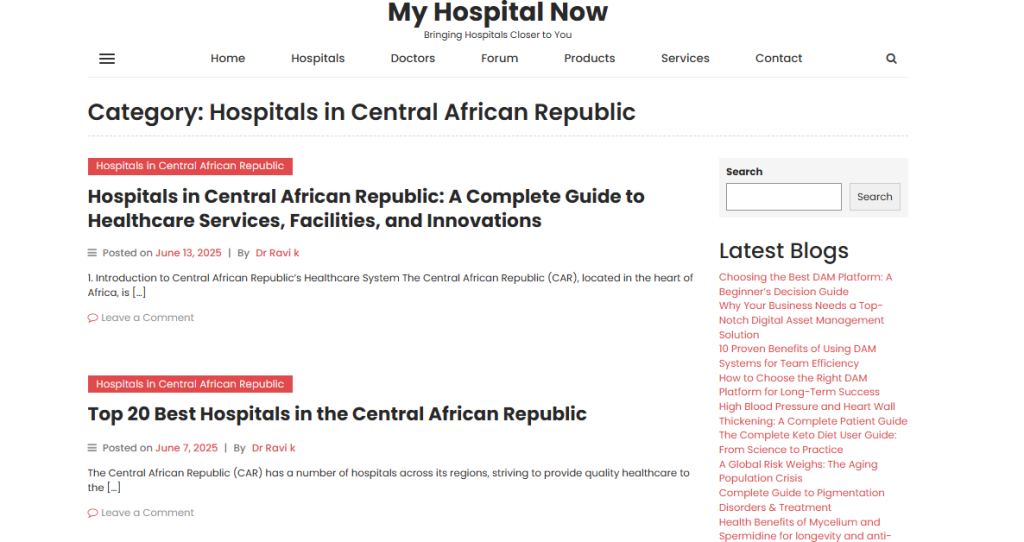
The Central African Republic (CAR), located in the heart of Africa, is building a more resilient healthcare system amid considerable challenges. While the country faces resource constraints and infrastructure limitations, there have been substantial reforms and international partnerships in recent years—expanding basic care, modernizing hospitals in the capital Bangui, and empowering community clinics across the provinces. The public healthcare system is supported by international organizations, NGOs, and growing private medical investments.
Today, CAR’s hospitals serve a dual purpose: providing life-saving emergency care and serving as key touchpoints for vaccinations, surgery, maternal health, and specialist treatment. Despite difficulties, the nation’s commitment to universal health coverage and digital resource management is helping bridge gaps. Through MyHospitalnow, international patients can safely access reputable providers, coordinate treatment or emergency care, and receive ongoing support throughout their healthcare journey in Central Africa.
Explore profiles, care options, and international assistance at:
The Central African Republic Healthcare System: Structure and Progress
- Health System Structure: CAR’s healthcare network includes public hospitals, private medical centers, and specialized clinics supported by government and global partners. Most care is delivered through public institutions owned and managed by the Ministry of Health, complemented by private and faith-based providers in Bangui and select regions.
- National Health Reform: Since 2020, the Ministry of Health, with international partners, has launched evidence-based plans for primary and district-level hospital reforms—expanding maternal and child health, preventive medicine, and digital tracking systems to increase transparency and reduce delays.
- Resource Allocation: Approximately 85% of healthcare funding is “off-budget,” relying on international aid, NGOs, and the government’s own funds to sustain services, especially for vulnerable populations and rural health zones.
- Universal Coverage Goals: Universal health coverage is the long-term aim, with recent action focusing on decentralized care coordination, maternal/child health, and expanding access to vaccines, emergency surgery, and infectious disease treatment.
- Data and Digital Health: New digital tracking (Health Resource Tracking—HRT) and quality improvement protocols are helping to ensure more efficient allocation and timely care, especially in areas with limited infrastructure.
Types and Highlights of Hospitals in the Central African Republic
| Hospital Name | City/Region | Specialties | Unique Strengths |
|---|---|---|---|
| Hôpital Communautaire de Bangui | Bangui | Emergency, surgery, pediatrics, OB/GYN | Largest public/teaching hospital |
| Berberati Regional Hospital | Berberati | Primary care, surgery, maternity, general medicine | Regional leader, connects SW areas |
| Bouar District Hospital | Bouar | Emergency, vaccinations, maternity, basic surgery | Serves remote northern regions |
| Clinique Pasteur | Bangui | Cardiology, orthopedic, specialized surgery | Modern private hospital, rapid access |
| Clinique de l’Amitié | Bangui | Cardiology, ortho, surgery, maternity | Private, advanced diagnostics |
| Centre de Santé Notre Dame | Bambari | Family medicine, community outreach | Community-focused, NGO-backed |
| Mobile Health Units | Various | Preventive care, immunization, referrals | Rural/remote populations |
In-Demand Specialties and Services
Patients choose CAR hospitals for:
- Emergency surgery and trauma care
- Maternal and neonatal care
- Pediatric services and immunizations
- Infectious disease diagnosis and treatment (malaria, TB, HIV)
- Cardiology, orthopedics, and basic surgical procedures
- Preventive medicine, health screenings, and family planning
- Chronic disease management (diabetes, hypertension)
- Diagnostics: lab, imaging, and telehealth consults in private centers
- Community-based preventive and wellness programs
International Patient Services
- Multilingual/English-speaking coordinators in major hospitals
- Guidance on travel, visas, registration, and documentation for international patients
- Transparent pricing and support with insurance claims, where available
- Partnerships with NGOs for complex or humanitarian cases
- Local and remote follow-up/telemedicine options in select clinics
- Liaison for medical evacuation and emergency transport, as needed
Why Choose Central African Republic for Healthcare?
- Steadily improving hospitals, with transparent services and affordable pricing
- Skilled teams, including many with international NGO partnerships and expat experience
- Major hospitals equipped for emergencies, maternal/child, and routine surgery
- Expanding digital technology for care tracking and case management
- Warm, supportive approach in both public and private facilities
Patient Testimonials
- “Bangui Community Hospital took great care of me during a medical emergency, and hospital staff spoke clear French and some English.” – Paul K.
- “Clinique Pasteur arranged my orthopedic consultation with quick access and high standards.” – Mireille D.
- “Berberati Hospital’s maternity team was supportive through my delivery, even coordinating aftercare with my home clinic.” – Mariam T.
- “We benefited from mobile health teams in our village—vaccinations and checkups were made available locally.” – Mbaye S.
Step-by-Step Guide for International Patients
- Review MyHospitalnow’s Central African Republic listings for facility options and up-to-date patient feedback.
- Provide records and care needs for tailored recommendations and booking assistance.
- Receive help with travel, registration, documentation, and logistics from the hospital team.
- Arrive for prompt check-in, consultation, and transparent billing.
- Access aftercare and telemedicine for post-discharge support and follow-up.
Frequently Asked Questions
Are hospitals in CAR internationally accredited?
A few private clinics and international partnerships ensure high standards in urban centers; public hospitals partner with NGOs for critical services.
Are English- or French-speaking doctors available?
French is the official language; English provided in private hospitals and with interpreter support.
Are costs clear for international patients?
Major facilities provide estimated costs in advance and can support insurance paperwork.
What specialties are available?
General and emergency surgery, maternity, pediatrics, infectious diseases, diagnostics, and chronic care.
Do hospitals help with logistics and informational support?
Yes; coordinators and social workers help patients manage paperwork, travel, and logistics throughout care.
Conclusion
Hospitals in the Central African Republic are becoming more effective, accessible, and welcoming for global patients, despite persistent challenges. MyHospitalnow is your guide for safe, reputable, and compassionate care, from first inquiry to healthy discharge.